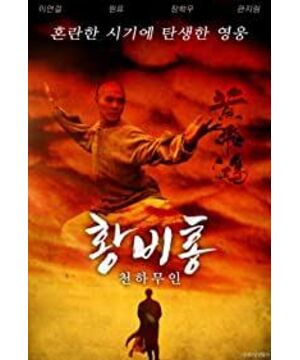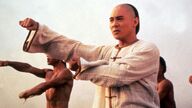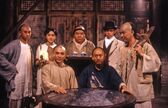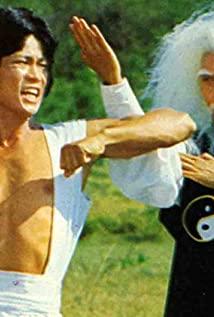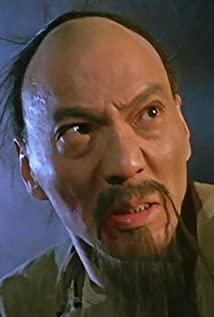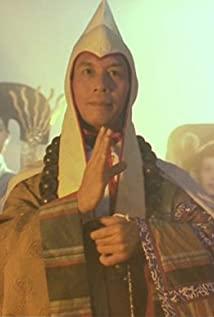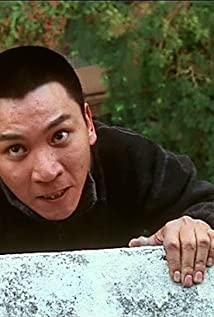During the viewing of the film, the respect has been on the rise, for the action instructions, for the composer, and for the crew.
The protagonist Huang Feihong is an extremely principled person, and before I tell about him, I want to recall the other pieces in the next film...
This is a chaotic world. The "Westernization Movement" is underway in the social background, and there are gradually more and more social groups: people who advocate cooperation with foreigners to make a lot of money, those who return from studying in the West but still insist on returning (Thirteenth Aunt), accept After Western medicine education, he learned from the Chinese bruise-style medical skills (Ya Rub Su), a person who symbolized the typical local lower-level people (pork Rong)... In the era of shaking hands and bowing at the same time, Chinese people have worshipped foreign countries, but also adhered to the local people. Culturally, it is one of the most impressive scenes when the musicians playing the national musical instruments in their hands and the street missionaries' words of "Hallelujah" in the teahouse. However, only the guests in the restaurant could not hear the sound of the missionaries, and they couldn't even hear the voices of the people at the table, so they began to complain; and the team led by the missionaries were all braids. Chinese boy; under the intensified confrontation between the voices of the two sides, what broke the situation was a long chirping from a Western ship. There is complexity in it, and through this clip, you can feel the complexity of the society at that time. China and the West resisted each other, but inevitably intertwined and influenced each other.
In the incidents, we gradually find out the principles of the character Huang Feihong and his character of sticking to his own principles. Compared with the narrative of "Sweet Honey", which is also mixed with social background, the helplessness and sadness of the characters in the film are slightly weaker, perhaps because his kung fu can stand out under repeated fights, and the resistance of the characters is limited. Ideally handled, it may be that the spirit and values of the author (director) are also influencing this trend. Cruelty is more placed in the pictures that the characters see, the people who died innocently under the guns. Here, the tragic character is the uncle who was rescued by Huang Feihong inadvertently (it was also through his narration that the conspiracy behind Mr. Jackson was revealed) who was deceived to come to "Golden Mountain" but became a slave, After being picked up by Huang Feihong, he still died under the ruthless gun holes in the end. Isn't he the epitome of misery? The light pursued by the Chinese people is just a phantom, death or decay is the final outcome (fatalism?)
Another tragic figure is undoubtedly Yan Zhendong (Yu Ye and Broth) who was also killed by bullets. The character's first appearance was in the rainy night. He swallowed his voice and picked up the copper coins on the ground, but no one cared about the bouquets thrown from the brothel that also fell in the rain (it seems to have hinted at the choice Yan Zhendong will make in the future). Here, kung fu is a tool for him to exchange money; (I missed a rainy night...forgot the plot TT) In the first battle with Huang Feihong, kung fu became a tool he desperately needed to gain a foothold in society; on the boat Shahe Gang performed martial arts almost madly under the praise of the crowd, and Kung Fu became a tool for him to maintain the social status or recognition he finally obtained (under use). Under the dissuasion of his apprentice Liang Kuan, he repeated his position over and over again, never seeing the characters struggling or "turning back to the shore". In the second duel with Huang Feihong, with the appearance of hidden weapons, he is no longer a righteous martial artist. The reason I still find this character tragic is because I think he's nothing more than a cornered man. (As for what was driven to a dead end, the film does not explain or criticize, in fact, we can probably guess a few points) (How come there is a hint of Camel Xiangzi...)
There are many pistols in it, not only Yan Zhendong's dying sentence: "No matter how good our kung fu is, we can't match the foreign guns and foreign guns." But the gist of the whole film is undoubtedly this sentence. The refutation is similar to the "Break and Stand " piled up using "ladders" in the fight scene in the final warehouse . The biggest joke is that in the end Wong Fei-hung killed Mr. Jackson with a one-fingered iron bullet, which proves that it is possible without a pistol. (But it is the combination of bullets and kung fu, which is similar to Wong Fei-hung's appearance in a dress with his thirteenth aunt at the end of the film.) Kung fu and foreign guns are just tool-like things executed under the will of man. artificial ".
View more about Once Upon a Time in China reviews


